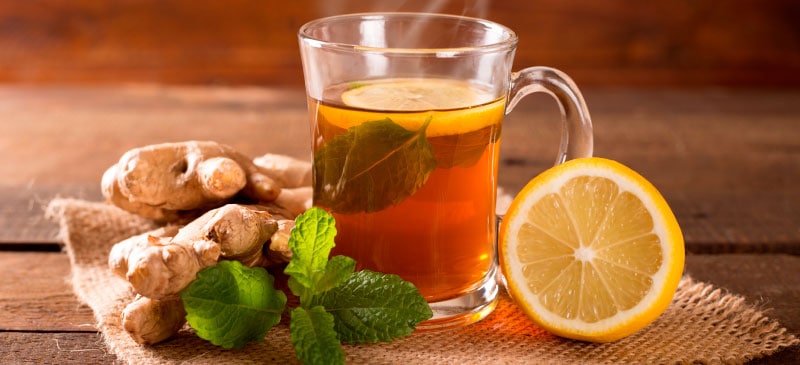
Tea is actually the most consumed beverage worldwide after water, so it’s quite likely you may be acquiring black tea benefits already on a regular basis.
Is black tea good for you? Loaded with antioxidants called polyphenols that protect human cells from hazardous free radical damage, it definitely makes the list of one of the top anti-aging foods.
Plus, black tea has been linked with improved mental alertness, lower ovarian cancer risk, and a possible decreased likelihood of developing Parkinson’s disease, diabetes, high blood pressure and heart disease.
While it’s typically consumed “black” and hot in the East, in the West it’s often consumed cold with lemon as iced tea or hot with milk and a sweetener like sugar or honey. Some varieties that may ring a bell include “English Breakfast” and “Irish Breakfast.” You may also be familiar with “Earl Grey,” which is a black tea with bergamot essential oil, or chai tea, which combines a variety of spices with black tea.
Black tea comes from the young leaves and leaf buds of the tea plant, Camellia sinensis. Black, white and green tea are all derived from this same tea plant.
What sets them apart is how the leaves are treated after picking. Black tea is more oxidized than oolong, green and white teas, which also makes it more strong in flavor.
Today, it is by far the most popular of the tea varieties, and it’s commonly consumed daily in Western as well as South Asian countries, like Sri Lanka and India. We definitely know it has a lot of fans, but how healthy is black tea?
Related: Jasmine Tea Benefits for Skin, Brain & Heart Health (Plus How to Make It)
Black Tea Benefits
1. Boosts Heart Health
There have been numerous studies revealing the positive effects of black tea on cardiovascular health. A study published in 2017 looked at the effects of drinking black tea on the risk of ischaemic heart disease. The study looked at more than 350,000 men and women between the ages of 30 and 79 from 10 areas in China.
When the researchers followed up about seven years later, they found that consumption of tea was associated with a reduced risk of ischaemic heart disease as well as a lower risk of major coronary events (like a heart attack).
Another study compared black tea (without additives) drinkers to plain hot water drinkers for a period of 12 weeks. It contained high amounts of flavan-3-ols, flavonols, theaflavins and gallic acid derivatives. The researchers found that daily consumption of black tea (nine grams) resulted in “a highly significant decrease” of cardiovascular risk factors, including triglyceride levels and fasting serum glucose.
There was also a significant decrease in the ratio of LDL to HDL cholesterol as well as an increase in HDL (“healthy”) cholesterol levels. Overall, the researchers concluded that drinking black tea “within a normal diet” leads to a decrease in major cardiovascular risk factors, and it also boosts antioxidant levels in humans.
In addition, a 2022 study published in Annals of Internal Medicine found that black tea benefits longevity. Adults who drank at least two cups of black tea daily were found to have a lower risk of all-cause mortality, in addition to lower risk of death from heart disease and stroke.
2. May Help Fight Cancer
Cancer fighter is also on the list of black tea benefits, as drinking black tea has been linked with the reduction of certain types of cancer.
For starters, a 2013 study published in the American Journal of Epidemiology investigated the effects of consuming flavonoid-rich black tea on prostate cancer risk in over 58,000 men in the Netherlands who provided detailed baseline information on several cancer risk factors.
Black tea is considered a major source of health-promoting flavonoids like catechin, epicatechin, kaempferol and myricetin. The study revealed that increased flavonoid and black tea intake was linked to a lower risk of advanced stage prostate cancer. However, no associations were observed for overall and earlier stages of prostate cancer.
Another promising study published in 2016 showed how the theaflavin-3 found in black tea had a very strong ability to stop the growth of cisplatin-resistant ovarian cancer cells. This is highly impressive finding since cisplatin is said to be “one of the most effective broad-spectrum anticancer drugs.”
In addition, the theaflavin-3 was less toxic to the healthy ovarian cancer cells, which is awesome since many conventional anticancer drugs kill both cancerous and healthy cells.
3. Helps Reduce Risk of Diabetes
Diabetes is an ever-growing chronic health problem around the world. A study published in the journal Diabetologia looked at tea (and coffee) consumption in relationship to the development of type 2 diabetes. The study involved 40,011 participants, and at the mean follow-up time of 10 years, the researchers found that 918 subjects had developed type 2 diabetes.
They also found that drinking both tea and coffee was linked with a decreased risk of type 2 diabetes. Specifically, drinking black tea, at least three cups per day, reduced the risk of type 2 diabetes by about 42 percent. This makes black tea beneficial as part of a diabetic diet plan.
In addition, a 2020 study found that the consumption of black tea worked to reduce blood sugar levels in both healthy and prediabetic adults. The results suggest that the polyphenols in black tea help reduce blood sugar about one hour after consumption.
4. Potentially Helps Stave Off Strokes
A meta-analysis published in 2009 found that drinking black or green tea daily may prevent ischemic stroke. Specifically, the researchers indicated that regardless of what country the subjects came from, the people who drank the equivalent of three or more cups of tea each day had an overall 21 percent lower risk of stroke compared to the subjects who drank less than one cup daily.

5. Relieves an Upset Stomach
If you have an upset stomach and are experiencing diarrhea, then drinking black tea may be just the answer. The tannins present have a helpful astringent effect on the intestinal lining, which can help calm inflammation in the intestines and get the diarrhea under control.
If you’re concerned you’re dehydrated, you can opt for decaffeinated black tea. A 2016 study showed that in 2- to 12-year-old patients with acute nonbacterial diarrhea, black tea tablets were not only effective, but also a safe and inexpensive way to help manage diarrhea not caused by bacteria.
6. Holds Antibacterial Ability
Black tea isn’t just a tasty beverage hot or cold — it also possesses potent antibacterial and antioxidant powers. Research has shown that its phenolic compounds as well as its tannins have the ability to inhibit some types of bacteria. In addition, the non-polymeric phenolic compounds are able to be absorbed by the gastrointestinal tract, making these bacteria-killing components of black tea orally active.
The consumption of black tea with honey has also been proven to specifically kill H. pylori bacteria, which can prevent all kinds of unwanted symptoms of a H. pylori infection, including ulcers.
7. Lowers Stress Hormones
This is definitely one of my favorite black tea benefits. While coffee is known for getting some people a little too energetic, tea has a reputation for being more of a balanced caffeine source and even a relaxation beverage that can work as a stress reliever in the body.
Research has shown that it can actually help its drinkers better recover from the common daily stresses of life by bringing stress hormones, like cortisol, back down.
In one study, 75 healthy male tea drinkers with an average age of 33 all provided their usual caffeinated beverages and were split into two groups. For the following six weeks, one group consumed a fruit-flavored caffeinated black tea mixture containing the active ingredients found in a cup of tea while the other group drank a beverage that tasted the same and had the same level of caffeine yet did not contain any other active tea components.
The subjects then underwent stress-inducing situations similar to what they would experience in normal life, which increased blood pressure in study participants. Researchers kept track of their stress hormone and blood pressure levels, as well as their heart rates and self-reported stress levels.
What did they find? The tasks were definitely stress-inducing according to all of the monitored health variables, yet 50 minutes after the stressor took place, the real black tea drinking group experienced a lowering of their cortisol levels that was noticeably lower in comparison to the fake tea drinkers. The real tea consumers also had their sense of relaxation rise after the stressful event compared to the fake group.
To add one more positive result of this study — drinking black tea led to lower blood platelet activation, which is involved in blood clot formation and raises the risk of heart attack.
READ RELATED: Eddy Burback Age, Girlfriend/Wife, Family, Wiki, Bio, Net Worth
Additional Benefits
These are some doses of black tea by mouth (consumed with standard tea leaf or as a tea extract) that have shown beneficial effects in scientific research for the following health concerns:
- Headaches and mental alertness: Up to 250 milligrams of caffeine per day to alleviate headaches and improve mental alertness.
- Heart attack and kidney stones: At least one cup of black tea each day to reduce heart attack and kidney stone risk.
- Atherosclerosis: One to four cups (125 to 500 milliliters) of brewed black tea each day to prevent hardening of the arteries.
- Parkinson’s disease: Men who consumed 421 to 2,716 milligrams of total caffeine (approximately five to 33 cups of black tea) daily seem to have the lowest risk of developing Parkinson’s disease. However, men who drink as little as 124 to 208 milligrams of caffeine (about one to three cups) daily also have a significantly lower chance of developing Parkinson’s disease. In women, one to four cups per day seems to be best.
- Alzheimer’s disease: Research gleaned from studying 957 Chinese seniors 55 and older found that “regular consumption of tea lowers the risk of cognitive decline in the elderly by 50 percent, while APOE e4 gene carriers who are genetically at risk of developing Alzheimer’s disease may experience a reduction in cognitive impairment risk by as much as 86 percent.”
Despite some findings in research studies, having 33 cups of black tea per day is not recommended. We all handle caffeine differently, but in general it’s not recommended to have more than five cups (40 ounces) each day, unless advised otherwise by your healthcare provider.
Related: Guayusa: The Antioxidant-Rich Ecuadorian Herbal Tea You Should Try
Nutrition Facts
Of all tea varieties, black tea is the highest in caffeine. The caffeine content of brewed black tea is considered moderate, typically averaging around 42 milligrams of caffeine per eight ounces, but it can be anywhere between 14 and 70 milligrams.
There are different grades of black tea. Whole leaf is the highest grade and has a very small amount of or even no changes to the tea leaf.
These highest-grade black teas are called “orange pekoe.” Pekoe tea is then further classified according to how many of the adjacent young leaves (two, one or none) were picked along with the leaf buds. The highest-quality pekoe tea only contains the hand-picked leaf buds.
The lower-grade black teas consist of broken leaves, fannings and dust. The black tea you find in tea bags is most often dust and fannings, which allow for a quicker brew but also a stronger, harsher taste. Whole leaf teas tend to be less harsh and more floral.
All black tea is made from oxidized tea leaves or, in other words, tea leaves that were allowed to wilt and brown after they were picked. This oxidation causes the formation of theaflavins and thearubigins, which are compounds that are responsible for its color and taste, along with its possible health benefits.
One cup of brewed black tea contains about:
- 2.4 calories
- 0.7 carbohydrates
- 0.5 milligrams manganese (26 percent DV)
- 11.9 micrograms folate (3 percent DV)
Black tea’s ORAC score of 1,128 is also quite impressive. ORAC stands for oxygen radical absorbance capacity, and this is a way of measuring the antioxidant content of food and beverages. It was developed by the National Institutes of Health.
The ORAC value of green tea is slightly higher at 1,253, so although green tea wins when it comes to antioxidants, it’s not by much. Still, black tea benefits are definitely directly related to this high antioxidant content.
Related: What Is EGCG? Benefits, Dosage, Safety & Top Foods/Drinks
How to Prepare (Plus Recipes)
To optimize black tea benefits, opt for one that is both organic and loose leaf. To avoid pesticides, it’s best to buy organic black.
It’s also a good idea to buy loose black tea rather than tea bags to avoid chemicals in the bags and to get the highest-quality tea.
When you steep black tea, you allow the flavor of the tea to infuse the hot water. The more steep time, the more intense the flavor and vice versa.
Scientists say that you shouldn’t steep your black tea for any less than two minutes, but a large majority of tea drinkers don’t wait for even that small amount of time.
Plus, many people drink their tea immediately, which means they get a less flavorful, less antioxidant-rich, very weak brew. To get the most black tea benefits, you definitely want to allow ample steeping time.
The healthiest black tea preparation seems to involve high water brewing temperature and no added dairy fat, meaning you drink the tea black. According to a study published in the International Journal of Food Sciences and Nutrition, adding milk to black tea appears to lower its antioxidant potential, especially full fat cow’s milk. In addition, researchers found that brewing the tea at a near-boiling temperature (90°C or 194°F) results in the highest amount of antioxidants and hence health benefits.
Here’s how to brew loose leaf black tea:
- Boil water in tea kettle.
- Using your teaware of choice, add one to two tablespoons of loose black tea to eight ounces or 12 ounces of just boiled 212 degrees F water (depending on how strong you like your tea as well as your mug size).
- Allow three to five minutes of steeping time.
- Serve in your favorite mug and enjoy!
Brewing can vary between different varieties of black tea so always read packaging directions carefully.
Black tea benefits can obviously come from a nice hot cup of tea. It can also be consumed cold as iced tea. You can use it to make a probiotic-rich kombucha.
Other tasty ways to get black tea benefits include:
Black tea has many uses in the kitchen, too, and it can be used in DIY body care recipes. Here are some non-food ways to use this tea’s benefits:
Risks and Side Effects
Is tea bad for you ever? A caffeine overdose is an inherent risk that comes with consuming black tea, but it’s easy to avoid if you don’t overdo it.
It’s recommended that you should not have more than five cups per day. More than that is considered unsafe.
You can also become psychologically dependent on tea’s caffeine. The beneficial effects of black tea or even a tea extract are definitely best experienced in moderation for these reasons.
If you’re pregnant or breastfeeding, drinking no more than three cups of black tea (about 200 milligrams caffeine) is considered likely safe. However, consuming more than this amount is possibly unsafe and has been associated with an increased risk of miscarriage, sudden infant death syndrome and other negative effects, including symptoms of caffeine withdrawal in newborns and lower birth weight.
If you have any ongoing health issues or currently take medication, check with your doctor before consuming it. There are a number of possible black tea medication interactions.
Black tea can decrease the body’s absorption of iron. If you don’t have an iron deficiency, this is likely not a concern. However, if you’re concerned, it’s recommended to drink the tea in between meals rather than with meals to decrease the unwanted interaction.
Consumption of black tea may also react with supplements, including but not limited to:
- bitter orange
- cordyceps
- calcium
- magnesium
- caffeine-containing supplements and herbs
- danshen
- creatine
- echinacea
- folic acid
- melatonin
- red clover
Speak to your health care provider for additional information if you use any of these supplements.
It’s possible to have a food allergy to black tea. Testing can determine if you have one. Discontinue consumption of this tea if you show any signs of a food allergy, especially if severe.
Conclusion
- So far, black tea benefits proven by science are quite impressive, including potentially boosting cardiovascular health, reducing blood pressure, decreasing diabetes risk, fighting cancer and lowering stress, just to name a few. High-quality black tea in moderation can definitely be a healthy addition to your diet.
- Black tea is also a great option if you’re currently looking to cut back on your coffee consumption. By swapping out a cup of coffee for a cup of black tea, you can still get the boost of mental alertness but with less caffeine.
- Everyone’s feelings and limits with caffeine are different so be mindful of that when drinking black tea. You can also experiment with all of the many delicious varieties of this tea to figure out which one best suits your taste buds.
- When you do have a cup of black tea, try to make it a relaxing and rejuvenating time for yourself because that makes the its benefits even greater.
Source:









